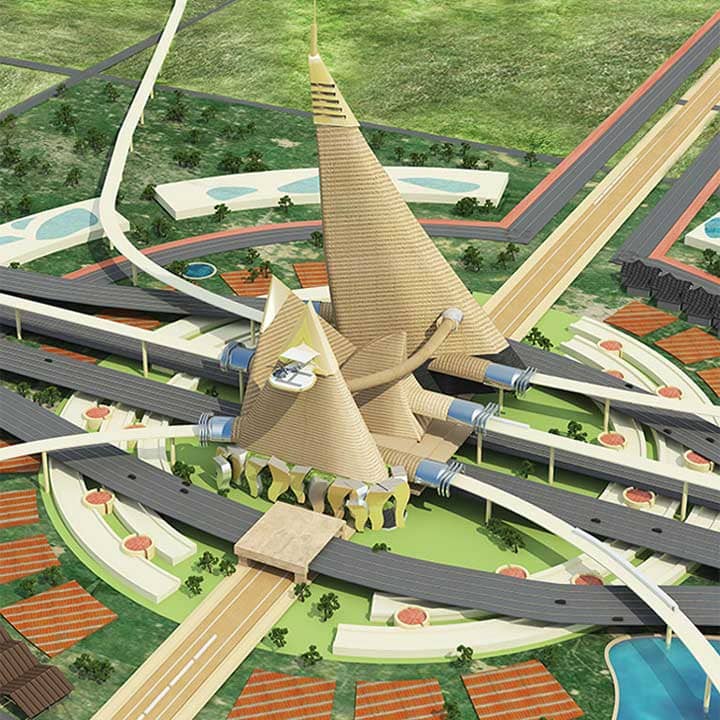Introduction
India is on the brink of a technological revolution with the development of Dholera Special Investment Region (SIR) in Gujarat, which is set to become India’s first smart industrial city. Designed as a world-class industrial hub with state-of-the-art infrastructure, seamless connectivity, and sustainable development practices, Dholera is poised to attract global investors and drive economic growth. Adding to this momentum, Tata Group is making a landmark investment of Rs 91,000 crore to establish a cutting-edge semiconductor manufacturing plant in Dholera. This move is expected to boost India’s semiconductor ecosystem, reduce import dependency, and position India as a key player in the global technology supply chain. The combination of a smart industrial city and a high-tech semiconductor plant is set to transform Dholera into a major driver of India’s industrial and technological growth.
Dholera: India’s First Smart Industrial City and Tata’s Rs 91,000 Crore Semiconductor Plant
India is taking giant strides toward becoming a global technology and manufacturing hub, and the development of Dholera Special Investment Region (SIR) in Gujarat is a testament to this ambitious vision. Dholera is set to become India’s first smart industrial city, offering world-class infrastructure, advanced technology, and seamless connectivity to attract global investors. Adding to the momentum, Tata Group is investing a staggering Rs 91,000 crore to establish a cutting-edge semiconductor manufacturing plant in Dholera, a move that will significantly strengthen India’s semiconductor ecosystem and reduce dependency on imports.
This blog explores the development of Dholera SIR, the importance of Tata’s semiconductor plant, and the transformative impact these projects will have on India’s economy.
Dholera SIR: India’s First Smart Industrial City
Dholera Special Investment Region (SIR) is a landmark project being developed under the Delhi-Mumbai Industrial Corridor (DMIC) initiative. Positioned about 100 kilometers southwest of Ahmedabad, Dholera is envisioned as a next-generation industrial hub that will set new benchmarks in urban planning, infrastructure, and sustainability.
Key Features of Dholera SIR
1. Massive Land Area:
Dholera SIR spans a vast area of 920 square kilometers, making it one of the largest planned industrial zones in India. In the first phase, development work is progressing over 153 square kilometers, with state-of-the-art infrastructure being put in place to attract global investors.
2. World-Class Infrastructure:
Dholera SIR is being developed as a plug-and-play industrial ecosystem equipped with:
- Smart city technologies, including IoT-enabled infrastructure
- Robust power and water supply systems
- High-speed internet and digital connectivity
- Waste management and sustainability initiatives
3. Multi-Modal Connectivity:
Dholera will be seamlessly connected to major cities and ports through a network of highways, expressways, and railways. The upcoming Ahmedabad-Dholera Expressway and the proposed Dholera International Airport will further enhance connectivity, facilitating the easy movement of goods and people.
4. Green and Sustainable Development:
Dholera is designed as a greenfield smart city, focusing on sustainable practices, energy efficiency, and eco-friendly industrial processes. Renewable energy projects, including solar and wind power, are expected to play a key role in Dholera’s development.
Tata Group’s Semiconductor Plant: A Game-Changer for India
In a monumental move that underscores India’s ambition to become self-reliant in semiconductor manufacturing, Tata Group is investing Rs 91,000 crore to establish a state-of-the-art semiconductor fabrication (fab) plant in Dholera. This project marks a significant milestone in India’s journey toward becoming a global hub for semiconductor manufacturing.
Why is the Semiconductor Plant Important?
Semiconductors are the backbone of modern technology, powering everything from smartphones and computers to automobiles and industrial equipment. India currently imports a large percentage of its semiconductor requirements, making it vulnerable to global supply chain disruptions. Tata’s investment in a semiconductor plant in Dholera will:
- Reduce Import Dependency:
By establishing a domestic semiconductor manufacturing facility, India will significantly reduce its reliance on imported chips, ensuring greater control over critical supply chains. - Boost Domestic Manufacturing:
The semiconductor plant will fuel the growth of the domestic electronics and manufacturing industry, enabling the production of advanced devices and equipment within India. - Strengthen India’s Position in Global Supply Chains:
With a state-of-the-art semiconductor plant, India can position itself as a key player in the global semiconductor supply chain, attracting foreign investments and partnerships. - Create High-Skilled Jobs:
The semiconductor plant will generate thousands of high-skilled jobs, creating opportunities for engineers, technicians, and industry experts, while also boosting the local economy.



